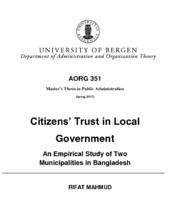Citizens' Trust in Local Government: An Empirical Study of Two Municipalities in Bangladesh
Master thesis

View/
Date
2017-06-22Metadata
Show full item recordCollections
- Department of Government [468]
Abstract
Institutional trust is an essential indicator in the governance mechanism involving the level of confidence which citizens’ have towards the public institutions. The present study focuses to find out the level of citizens’ trust in municipalities, i.e. in city corporations in Bangladesh. The study also tries to find out what factors explain the variations in the trust level. The study was based on cultural approach and institutional or performance approach of institutional trust. The data used in the analysis are taken from the survey of the citizens at the two city corporations under study, conducted by the researcher during the data collection period of summer 2016. Based on the cultural approach, the study developed three main explanatory variables which are social capital, power distance and uncertainty avoidance. The study also focuses on various socio-political demographic factors affecting the trust level at city corporations. The other two explanatory variables involving the institutional or performance approach of trust are citizen or customer satisfaction along with quality of government. The main findings are, first, that citizens’ level of trust in city corporations is high and indicates cumulative pattern, i.e. high level of trust in one measure tends to extend to other measures. Second, cultural variables have the strongest overall effect on variations in citizens’ trust in municipalities in Bangladesh than institutional or performance variables. Individual associationism or networking along with citizens’ acceptance of the use of power in getting services are most important determining variables affecting trust in city corporations. Finally, trust in municipality is also influenced by demographic factors, mainly by citizens’ occupation.